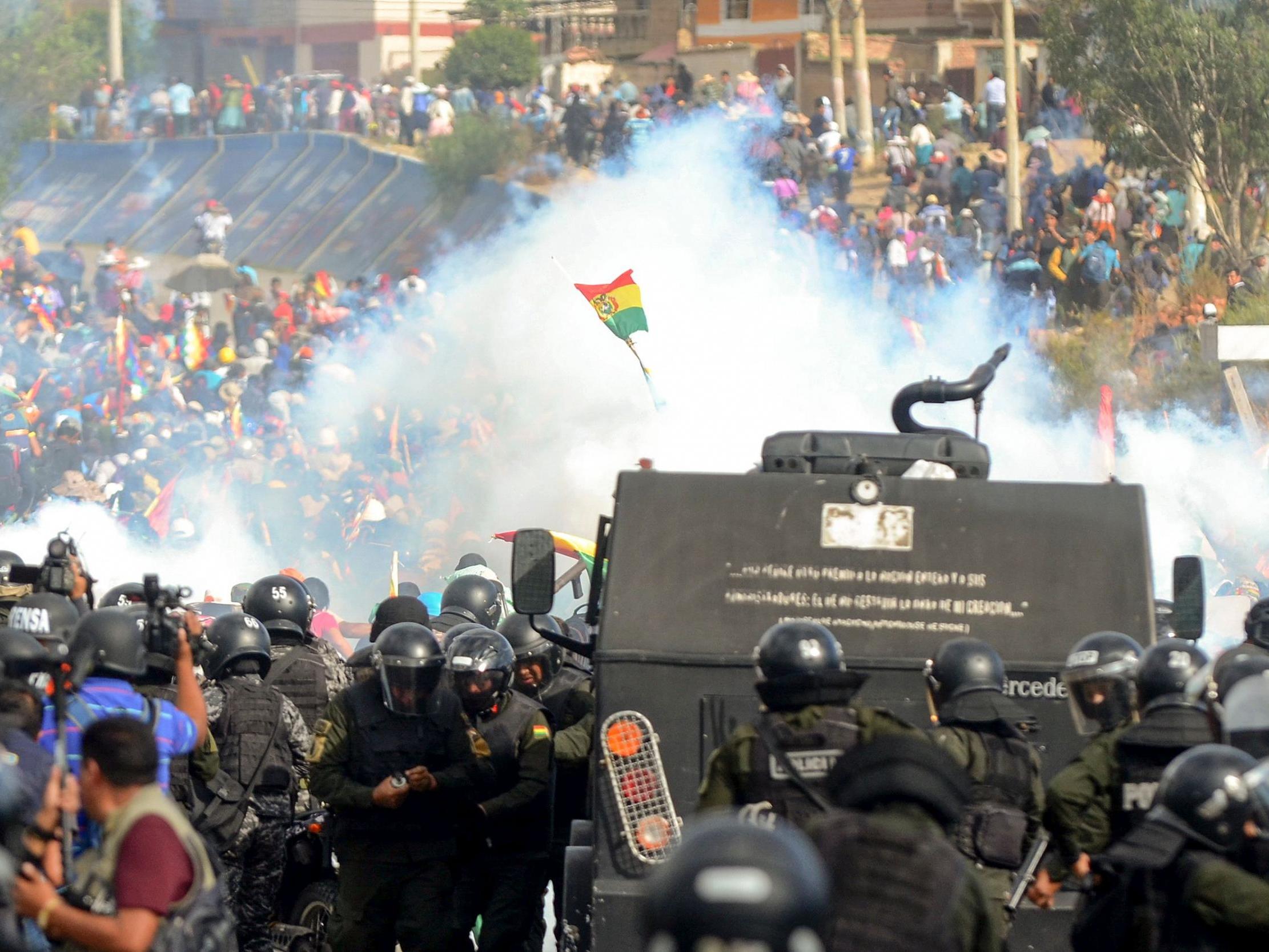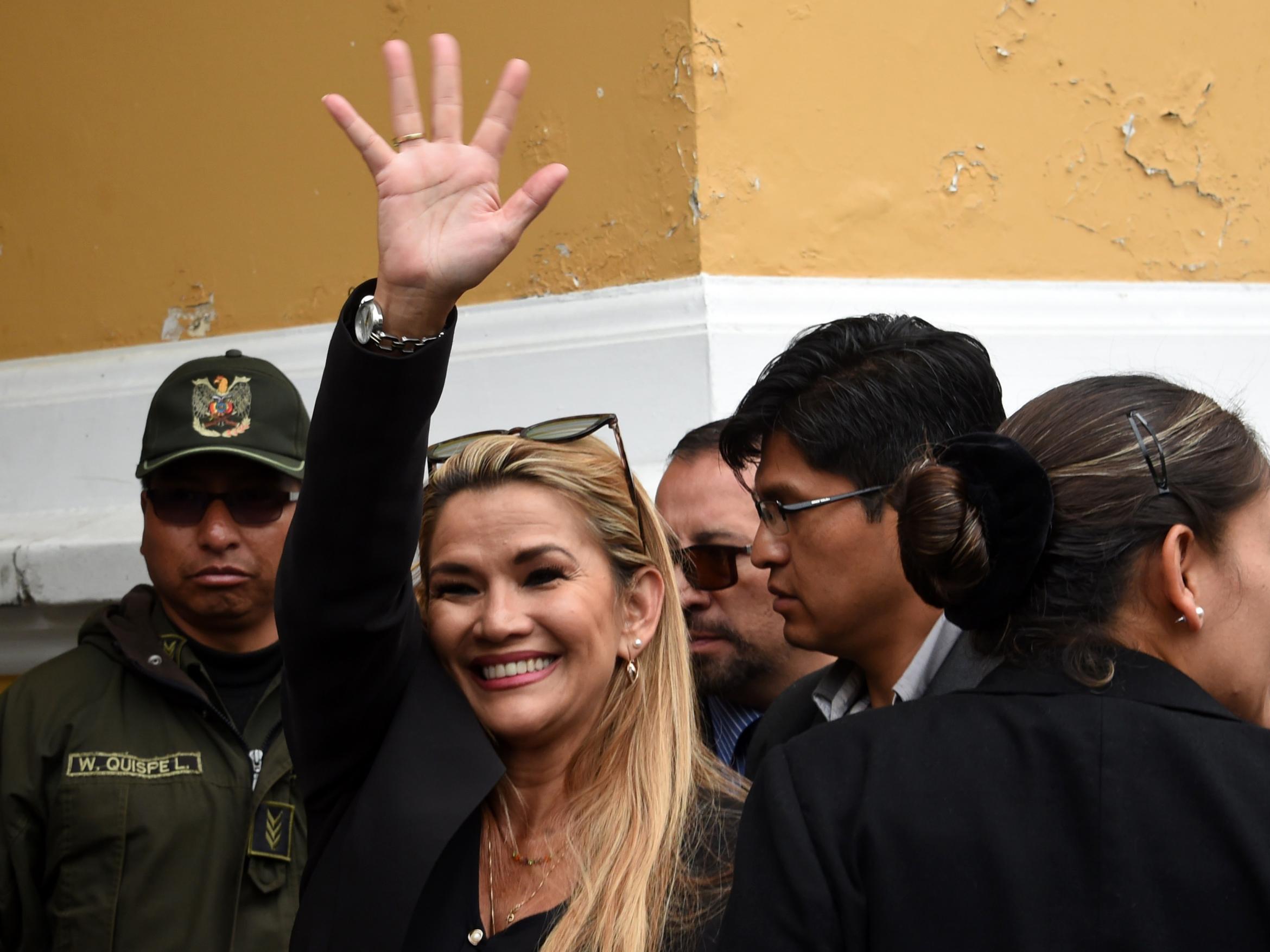UN warns Bolivia crisis could ‘spin out of control’ after nine killed in latest violence
Protesters loyal to former president Evo Morales fired upon by armed police

Your support helps us to tell the story
From reproductive rights to climate change to Big Tech, The Independent is on the ground when the story is developing. Whether it's investigating the financials of Elon Musk's pro-Trump PAC or producing our latest documentary, 'The A Word', which shines a light on the American women fighting for reproductive rights, we know how important it is to parse out the facts from the messaging.
At such a critical moment in US history, we need reporters on the ground. Your donation allows us to keep sending journalists to speak to both sides of the story.
The Independent is trusted by Americans across the entire political spectrum. And unlike many other quality news outlets, we choose not to lock Americans out of our reporting and analysis with paywalls. We believe quality journalism should be available to everyone, paid for by those who can afford it.
Your support makes all the difference.The United Nations has warned mounting unrest in Bolivia could “spin out of control” after nine people died in the latest escalation of violence between between security forces and supporters of former president Evo Morales.
Protesters loyal to Mr Morales, who resigned from office and fled to Mexico after being accused of electoral fraud, were fired upon by armed police on Friday after attempting to cross a military checkpoint in the central city of Sacaba.
Witnesses reported seeing the bloodied bodies of several demonstrators, while dozens more were rushed to hospitals. Bolivia’s national ombudsman later confirmed nine people had died, bringing the death toll from the violence which has rocked the country to 23.
The protests follow Jeanine Anez’s assumption of presidential power earlier this week following last month’s disputed election. The 52-year-old stepped in to fill the political vacuum after Bolivia’s vice-president and the leaders of the senate and lower house joined Mr Morales in resigning.
On Saturday, UN human rights chief Michelle Bachelet issued a statement calling the latest deaths “an extremely dangerous development.”
“I am really concerned that the situation in Bolivia could spin out of control if the authorities do not handle it sensitively and in accordance with international norms,” she said.
“Repressive actions by the authorities... are likely to jeopardise any possible avenue for dialogue,” she added.
The Inter-American Commission on Human Rights also condemned Ms Anez’s administration for issuing a decree it says “exempts from criminal responsibility” soldiers who have taken part in efforts to suppress the unrest.
Mr Morales, who has said he is willing to return to Bolivia to stage a fresh round of elections, described Friday’s violence as a “massacre”.
He added: “Now they are killing our brothers in Sacaba, Cochabamba.”
Pro-Morales politicians have been seeking to challenge the legitimacy of Ms Anez’s government, boycotting a congressional called to formalise her claim to the presidency, and have been attempting to stage new counter sessions.
Ms Anez’s appointment as interim leader has been endorsed by Bolivia’s Constitutional Court – as well as the United States, which announced its support on Wednesday.
So far, she has named members of her cabinet and appointed new personnel to lead the armed forces.
In her first address to the nation as interim president, Ms Anez stressed her position was “strictly provisional”, adding she plans to “call for new general elections in the earliest possible time.”
She later told CNN. “Obviously, as soon as we can, we will call general elections so the Bolivian people can have a president elected by us in a democratic manner.”
Ms Anez stressed Mr Morales would not be allowed to participate in the new elections, which are supposed to be held within three months, and that he would face possible legal charges for electoral fraud were he to return to Bolivia.
She will now need to form a new electoral court and get congress, which is controlled by Mr Morales’s Movement for Socialism party, to vote on a new election. All of this must be achieved by 22 January, when the exiled ex-president’s current term was due to end.

Mr Morales resigned last Sunday, under pressure from Bolivian military officials, shortly after an Organisation of American States audit reported widespread irregularities in the election results from 20 October.
This came after weeks of protests, fuelled by allegations of electoral manipulation, and controversy over the decision to allow the 60-year-old to run for a fourth term.
Bolivia’s first indigenous president subsequently arrived in Mexico under a grant of asylum, leaving his country behind in turmoil. His resignation still needed to be approved by both houses of congress, and politicians could not assemble the numbers needed for formal sessions.
Mr Anez forged ahead regardless, arguing that Bolivia could not wait.
As a result, Mr Morales, a one-time llama shepherd from the Bolivian highlands, claims he technically remains president.
Supporters of Mr Morales, who was Bolivia’s president last survivor from the “pink tide” of South American leftist leaders, have been staging disruptive protests since his resignation, setting up blockades that forced closure of schools and caused shortages of gasoline in La Paz.
The 60-year-old was first elected as president in 2006. He won praise for lifting millions out of poverty, increasing social rights and presiding over stability and high economic growth in South America’s poorest country.
He said the decision to relinquish power had been taken in response to mounting pressure and to stop fellow socialist leaders from being “harassed, persecuted and threatened”.
“While I have life I’ll stay in politics, the fight continues,” he said last week. “All the people of the world have the right to free themselves from discrimination and humiliation.”
“The president of Mexico saved my life,” he added, thanking president Andres Manuel Lopez Obrador for granting him asylum.
Additional reporting by agencies
Join our commenting forum
Join thought-provoking conversations, follow other Independent readers and see their replies
Comments